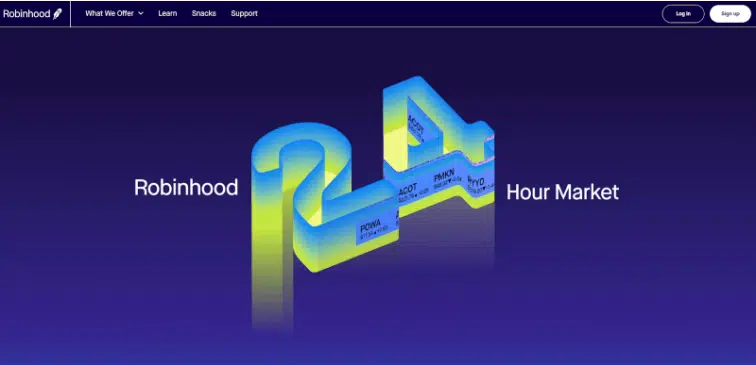TL;DR
- This comparison guide evaluates Coinbase vs Robinhood on essential aspects such as fees, user experience, security, and more.
- Coinbase has a much wider selection of cryptos, but Robinhood’s traditional assets offer greater potential for diversification. Let’s dig in!
Coinbase is the largest regulated cryptocurrency exchange in the United States. However, we were also interested in determining whether it is the best, especially for new crypto users.
One of its competitors, Robinhood, started as a trading online brokerage platform for traditional asset classes. However, it decided to include cryptocurrencies in its offering due to demand that continued to increase.
This comparison guide will consider numerous aspects of the two platforms to determine which is better for cryptocurrency traders, including experts and newcomers.
Coinbase vs. Robinhood: Summary
| Coinbase | Robinhood | |
| Main platform features | User-friendly apps available in 100+ countries, | An Easy-to-use trading application that is available only in the USA. |
| Fees | Maker-taker exchange fees as high as 0.50% | No Fee |
| Number of cryptocurrencies supported | 250+ | 18 |
| Security features | 2-step verification, FDIC-insured USD balances, AES-256 encryption for digital wallets | 2-step verification; FDIC-insured USD balances; and cash funds; insurance against crypto platform breaches |
| Types of transactions supported | Buy, sell, send, receive, and exchange | Limit orders, buy, and sell |
Robinhood vs. Coinbase
Robinhood vs. Coinbase: Features
Both Robinhood and Coinbase are US-based online trading platforms that share many similarities and certain differences.
Coinbase was made strictly for cryptocurrency trading. Robinhood, however, offers traditional assets and cryptocurrency trading on exchanges that withdraw crypto.
Coinbase:
- Staking: Coinbase allows users to earn rewards by staking certain cryptocurrencies, enhancing passive income.
- Educational Rewards: Users can earn cryptocurrency by engaging with Coinbase’s educational content, merging learning with rewards.
- Advanced Trading: Coinbase Pro is targeted at professional traders. This platform provides charting tools and specialized order types.
- NFT Marketplace: Coinbase offers a platform for users to trade digital assets, capturing the NFT trend.
Robinhood:
- Crypto Trading: Robinhood simplifies crypto transactions with a flat fee structure and no direct commissions, making it cost-effective.
- Diverse Asset Selection: Beyond crypto, Robinhood provides stock, ETF, and options trading, appealing to broad-based investors.
- Cash Management: Users can earn a competitive 4.4% APY on uninvested cash, optimizing idle resources.
While Coinbase focuses on delivering a comprehensive crypto experience, Robinhood offers a more diversified investment platform, integrating cryptocurrency with traditional financial tools.
Robinhood vs. Coinbase: Supported cryptocurrencies
Coinbase and Robinhood differ significantly in terms of supported tokens.
Coinbase offers access to over 250 cryptocurrencies that have been meticulously researched and identified as non-securities. In contrast, Robinhood provides a more limited range with 18 select cryptocurrencies.
Here are some of the main currencies supported by the exchanges:
- Bitcoin
- Ethereum
- USD Coin
- Cardano
- Solana
- Dogecoin
- Polygon
- Shiba Inu
- Avalanche
- Ethereum Classic
- Uniswap
- Litecoin
- Chainlink
- Stellar Lumens
- Bitcoin Cash
- Tezos
- Aave
- Compound
When examining variety, Coinbase undoubtedly has the upper hand in the diversity of supported cryptocurrencies.
Robinhood vs. Coinbase: Security
Coinbase and Robinhood both prioritize user security with features such as two-factor authentication and insurance on users’ funds. Coinbase distinguishes itself by transparently storing 98% of its digital assets in cold storage, backed by an insurance policy for security breaches.
On the other hand, Robinhood, while using cold storage for its digital assets, doesn’t specify the extent. Additionally, Robinhood offers its investors the added advantage of Securities Investor Protection Corporation (SIPC) coverage for traditional assets like ETFs, stocks and cash.
Robinhood vs. Coinbase: Fees
Coinbase has a somewhat complex fee structure. The platform charges a spread on all crypto assets for sales and purchases. Its rates can vary significantly based on volatility, but the company previously stated that it charges roughly 0.5%. The fees are not completely transparent, and traders will learn how much they must pay at the end of their transaction(s).
Robinhood has a cost-effective offer, as it doesn’t charge any trading fees or commissions. However, it is not a completely zero-fee platform. It makes a profit via a payment-for-order flow (PFOF) system. The firm routes user orders through a market maker, which executes the trades and pays the platform for the business.
While both platforms prioritize security, Coinbase provides more transparency in its cold storage practices. In contrast, Robinhood stands out with its SIPC coverage.
Robinhood vs. Coinbase: Ease of use
Both Coinbase and Robinhood prioritize user-friendliness to cater to the increasing influx of novice crypto traders.
Recognizing that simplicity is crucial, especially for those unfamiliar with trading, these platforms streamline processes from sign-up to trading on both web and mobile interfaces.
Robinhood additionally draws in those keen on options trading in traditional markets, necessitating a user-friendly platform for a smoother transition into crypto trading.
In this duel of accessibility, Robinhood might have a minor advantage, especially for those crossing over from traditional markets to crypto.
Now that we have highlighted the main differences, let’s go over the exchanges one by one in detail.
Coinbase overview

Platform users
According to Coinbase, the exchange operates in all US states apart from Hawaii, where it still awaits support. It also operates in most European countries, bringing its total coverage to over 100 nations worldwide. The exchange also has around 40.3 million monthly visits as of July 2023, half of US citizens.
Fees
Regarding fees, Coinbase charges a spread on crypto sales and purchases. Its rates can vary significantly based on volatility, but the company previously stated that it charges trading fees of roughly 0.5%.

Users should note that the fee does not apply for orders used with its Advanced Trade.
The number of cryptocurrencies on offer
As of September 2023, Coinbase can offer over 250 cryptocurrencies.
Coinbase conducted one crypto audit after another, listing any digital asset, buy and sell cryptocurrency, crypto exchange, or crypto wallet that passed SECs check.
Security
The platform was hacked once, in 2021, due to a security flaw that briefly compromised its systems. However, since then, the platform has doubled down on security features.
Types of transactions available
Coinbase allows users to buy, sell, send, receive, and exchange any listed digital assets.
Robinhood overview

Platform users
Robinhood’s intuitive design originally catered to traditional assets like stocks and ETFs. As cryptocurrency demand surged, it incorporated major cryptos into its offerings. Currently, its services are exclusively available to US citizens.
Fees
One of Robinhood’s biggest strengths in margin trading apps as an advanced trading app and platform is the fact that it charges no commissions for margin trading.
However, there is an order flow fee, which varies from trade to trade.
The number of cryptocurrencies on offer
As of 2023, Robinhood supports 18 cryptocurrencies alongside its traditional asset offerings. This dual functionality makes it an appealing choice for investors looking to blend cryptocurrency with other asset classes in their portfolios.
Security
Though Robinhood has never faced a financial loss due to hacking, it did experience a security breach in 2020. This incident exposed the email addresses of five million users and the full names and physical addresses of an additional two million users.
Types of transactions available
Robinhood allows users to buy and sell stocks exchange-traded funds, buy and sell the funds and use limit orders advanced trade them.
Final Verdict
Coinbase and Robinhood are two leading crypto trading platforms that are easy to use and have several benefits.
They differ in certain areas, such as Robinhood charging no trading fees on crypto but offering only a handful of coins and tokens.
In contrast, Coinbase charges a commission but has over 250 listed coins. Robinhood is only available in the US, while Coinbase offers services in over 100 countries.
Ultimately, selecting a platform depends on the user and their desire.
Methodology
In this comparison, we looked at the features of Robinhood and Coinbase, such as functionality, ease of use, fees, available assets, and more. After identifying these crucial features, we broke them down to see what they offer and how they affect the user experience.
Robinhood stands out as an appealing choice for investors wanting to blend traditional investments like stocks and ETFs with digital assets, such as cryptocurrencies.
This all-in-one platform offers an accessible mobile app and a commission-free service, earning its reputation as a top online broker.
Pioneering the no-commission stock trading model, Robinhood extended the same 0% commission policy to crypto trading, making profits through a method known as payment for order flow.
On the other hand, Coinbase serves as an institutional platform, focusing mainly on cryptocurrencies. If Coinbase doesn't meet your needs, other alternatives like Bitstamp, Kraken, eToro, Gemini, and Binance might be worth considering. Among these, Kraken is often noted for its lower fees and enhanced security, making it a favorable option compared to Coinbase.







